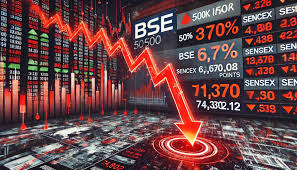Indian equity markets witnessed a sharp decline on Friday, as a wave of selling pressure sent major stocks tumbling. Among the hardest hit were Tata Consultancy Services (TCS), State Bank of India (SBI), and Tata Motors, which, along with seven other Nifty 50 stocks, fell to their lowest levels in the past 52 weeks. The broad-based sell-off was driven by a combination of global market uncertainties and domestic economic concerns, leading to heightened volatility. Investor sentiment took a hit as fears of economic slowdown, geopolitical tensions, and fluctuating market conditions added to the downward pressure, causing significant losses across sectors.
Indian stock markets experienced a sharp downturn on Friday, with benchmark indices suffering significant losses as investor sentiment weakened. A steep decline in IT and financial stocks, combined with renewed fears of a global trade war and continued selling by foreign institutional investors, contributed to the broad-based sell-off.

The Nifty 50 index dropped 1.2%, settling at 22,271.40, while the BSE Sensex plunged more than 1,000 points, or 1.34%, to reach 73,602 in early trading. The downturn was driven by mounting concerns over global economic uncertainties and domestic market pressures, leading to widespread losses across key sectors.
Among the worst-hit stocks, Tata Consultancy Services (TCS) witnessed a sharp fall of 4.3%, hitting a fresh 52-week low at ₹3,457. State Bank of India (SBI) also saw a notable decline, slipping 1.8% to ₹691.05. Tata Motors extended its losses, dropping 3% to ₹629, while engineering giant Larsen & Toubro (L&T) slid 1.4% to ₹3,163.05.
Several other blue-chip stocks also faced significant declines. Bharat Petroleum, Dr. Reddy’s Laboratories, Hero MotoCorp, ITC Ltd, and Power Grid Corporation all lost over 2% during the session, while Asian Paints retreated 1.6%. The broad-based selling pressure indicated growing investor caution amid a challenging economic and geopolitical landscape, fueling uncertainty across financial markets.
The market sell-off deepened as investor concerns mounted over a potential prolonged global economic slowdown and rising trade tensions. The latest trigger came from U.S. President Donald Trump’s unexpected announcement to fast-track the implementation of a 25% tariff on imports from Canada and Mexico. In addition to these measures, he also proposed imposing an additional 10% tariff on Chinese imports, further escalating fears of a global trade war.
The announcement sent shockwaves through international financial markets, amplifying risk aversion among investors. The uncertainty surrounding trade relations between major economies led to heightened volatility, as market participants weighed the potential impact on global supply chains and economic growth. Reflecting this broader risk-off sentiment, the MSCI Asia ex-Japan index dropped by 2%, signaling widespread caution across Asian markets. The prevailing concerns over trade disruptions and economic uncertainty contributed to the sharp downturn in equities, as investors sought to reassess their positions amid an increasingly uncertain global economic landscape.
Investor sentiment in India remained notably fragile, as markets grappled with mounting concerns about a slowing domestic economy. With key GDP data on the horizon, anxiety over potential growth weakness added further pressure to the already volatile situation. The Nifty 50 index has now fallen by 15% from its peak reached just five months ago, marking the index’s longest losing streak in nearly three decades. This sharp decline has been particularly pronounced among smallcap and midcap stocks, which have lost over a quarter of their value as many previously overvalued shares continue to undergo a significant correction.
The overall market unease has been exacerbated by the global backdrop of rising trade tensions, particularly with the United States. Dr. V K Vijayakumar, Chief Investment Strategist at Geojit Financial Services, pointed out that stock markets are highly sensitive to uncertainty, and the uncertainty has been intensifying since U.S. President Donald Trump’s election. He noted that the series of tariff announcements by Trump, particularly the latest move to impose an additional 10% tariff on China, has reinforced the market’s perception that Trump’s early presidency would be characterized by aggressive tariff threats. These actions, he explained, are seen as part of a broader strategy to put pressure on other countries and eventually negotiate favorable settlements for the U.S. The ongoing tariff actions, coupled with an overall global climate of trade uncertainty, have contributed significantly to the market’s downward trajectory.
The ongoing selling by foreign institutional investors (FIIs) has added significant pressure to Indian equities, contributing to the market’s downward momentum. So far in 2025, foreign investors have withdrawn a net $12.2 billion from Indian stocks, continuing a trend that began in the latter part of 2024. In the final quarter of 2024 alone, FIIs sold off a net $12.3 billion worth of Indian equities. This sustained outflow of capital has raised concerns among market participants, as it reflects a cautious stance from overseas investors, who are likely responding to global economic uncertainties, domestic market conditions, and broader geopolitical factors. The heavy FII selling has exacerbated the challenges faced by Indian markets, which have already been under pressure due to weakening economic growth and rising volatility.
On Friday, the Indian stock market saw a significant decline, with the IT sector at the forefront of the sell-off. The IT sector index plummeted by 4%, driven by concerns over slowing global demand, particularly after weak economic data from the United States. This latest downturn marked a challenging week for the IT sector, which has now lost nearly 8% in value over the past few days, significantly underperforming the Nifty 50 index, which saw a more moderate decline of 2%.
The pressure on the market was not limited to the IT sector alone. The financial sector also faced considerable challenges, with 17 out of the 20 financial stocks in the Nifty 50 index trading lower. This broad-based weakness in key sectors highlighted the growing concerns over both domestic and global economic conditions, as investors reacted to the prospect of slower economic growth and increasing market volatility.
Friday’s sharp market decline resulted in a significant loss of market value, with BSE-listed companies witnessing a reduction of Rs 7.16 lakh crore in their combined market capitalization. This wiped out a substantial portion of the overall market valuation, which now stands at Rs 385.94 lakh crore.
Dr. V K Vijayakumar, Chief Investment Strategist at Geojit Financial Services, highlighted that the current market weakness could present an opportunity for long-term investors. He suggested that investors with a long-term horizon might consider gradually accumulating quality large-cap stocks that are fairly valued. Additionally, he pointed out that certain sectors, such as defense, which may offer reasonably priced stocks, could be potential areas of interest for investors looking to take advantage of the market’s current correction.
As the Nifty 50 index approaches its fifth consecutive month of losses, marking its longest losing streak in nearly 30 years, market participants are keenly monitoring both domestic economic data and global developments for any indications of stability. The ongoing downturn has left investor sentiment fragile, with concerns over economic growth and heightened volatility weighing heavily on the market. Despite hopes for a potential recovery, the selling pressure remains persistent, and there are few signs that it will ease in the near future. This continued uncertainty leaves the market vulnerable to further downside risks, with investors remaining cautious and waiting for clearer signals of stabilization before committing to any significant shifts in their portfolios.

